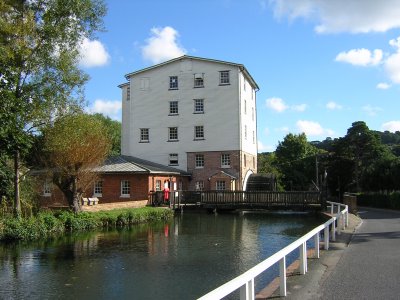Introduction
 Crabble Corn Mill, River, near Dover in Kent, opened as a working watermill museum and visitor attraction in 1990, following the successful rescue and restoration of this unique historic building which had been on the Buildings-At-Risk register. It’s the only surviving example of it’s type and, therefore is a Grade 2 Star Listed building. The Restoration Project won The R.I.B.A. Community Enterprise Scheme Award presented by Prince Charles.
Crabble Corn Mill, River, near Dover in Kent, opened as a working watermill museum and visitor attraction in 1990, following the successful rescue and restoration of this unique historic building which had been on the Buildings-At-Risk register. It’s the only surviving example of it’s type and, therefore is a Grade 2 Star Listed building. The Restoration Project won The R.I.B.A. Community Enterprise Scheme Award presented by Prince Charles.As a Merchant Mill, it’s economic years of operation were 1812 to 1893. It is semi-automatic, waterpowered and the only one of it’s type still surviving from the early industrial revolution.
I am the coFounder of the Mill Trust. At the beginning of 2005, after more than a decade’s absence following the completion of The Restoration Project, I was invited by the current Trustees to look again to see if there are ways in which I could help resolve some of the outstanding issues and complete “unfinished business” which is now a growing cause for concern. In February I had a series of meetings with local stake-holders and other interested parties. I held an open evening jointly for the Friends of the Mill and the Trustees, to gain an overview of the scope of work envisaged and also to gain consensus on the way forward. From this, the Trustees asked me to be Project Development Manager and nominated me to represent the Mill on these matters. The Mill Trust is a Building Preservation Trust founded in 1987. The primary object is:
“To promote the education of the public through the restoration and preservation of Crabble Corn Mill, Dover, Kent and through the development and use of the Mill as a working museum exemplifying the processes and techniques involved in historic milling by water power, particularly related to the 19th century.”
Since restoration the Trust has acquired further land and the two remaining Mill cottages which have yet to be restored and brought into economic use. The Mill is open to the public, and is entirely dependent on volunteers.
The café/ tea room, is popular with the River community and is frequently used for private bookings and local events such as quiz nights, folk nights and more recently, a beer festival.
The Mill also produces organic stoneground wholemeal flour using French Burr stones, a quartz which produces the finest quality.

0 Comments:
Post a Comment
<< Home